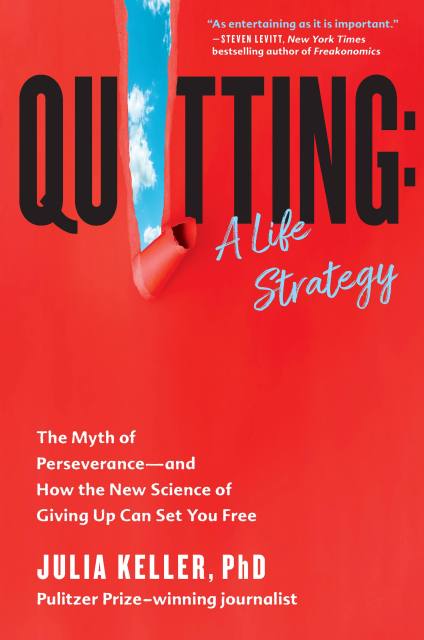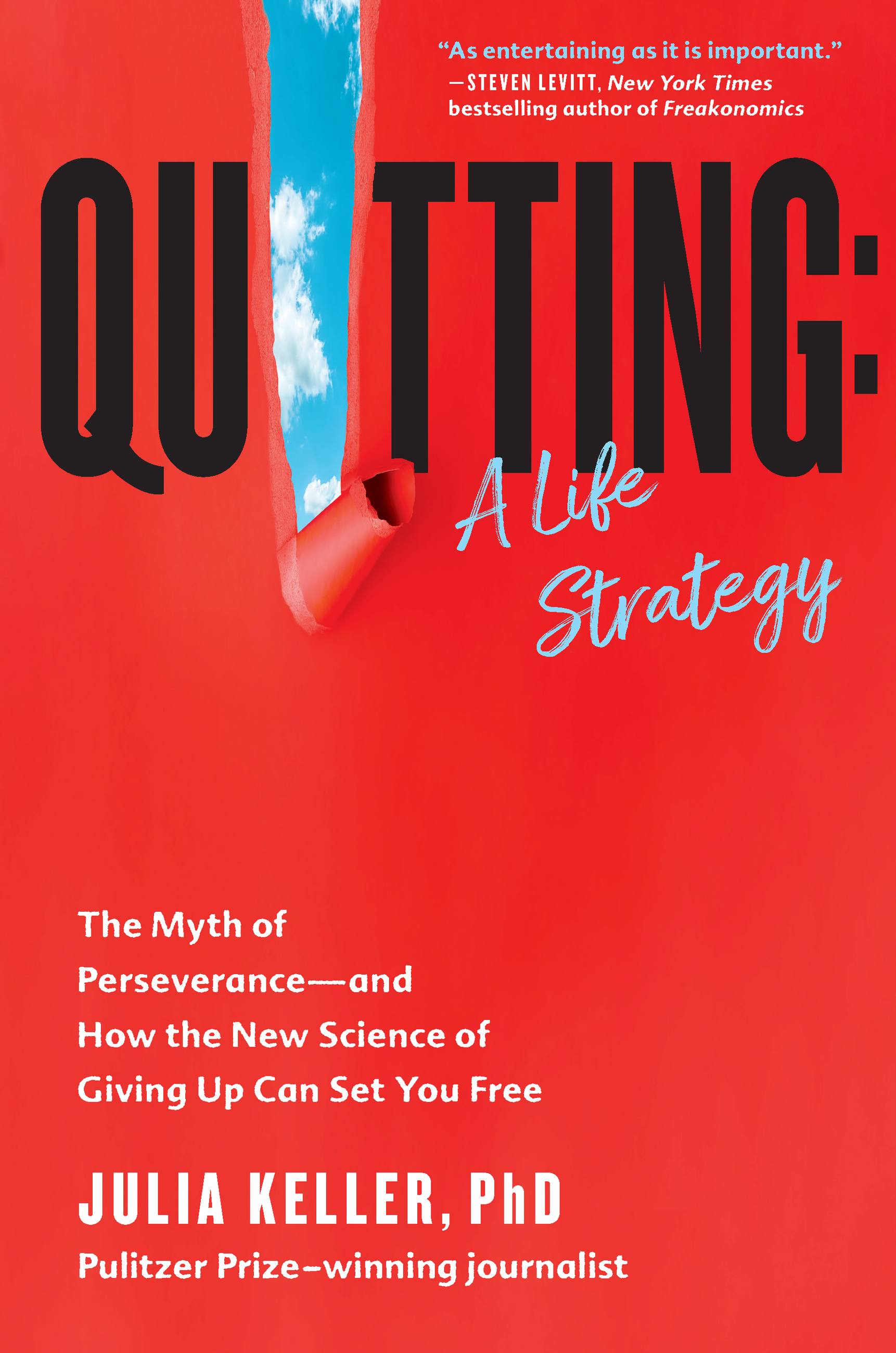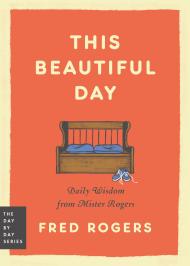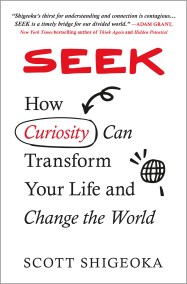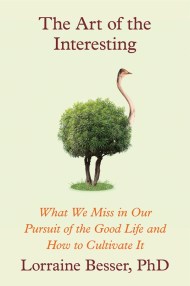By clicking “Accept,” you agree to the use of cookies and similar technologies on your device as set forth in our Cookie Policy and our Privacy Policy. Please note that certain cookies are essential for this website to function properly and do not require user consent to be deployed.
Quitting: A Life Strategy
The Myth of Perseverance—and How the New Science of Giving Up Can Set You Free
Contributors
By Julia Keller
Formats and Prices
- On Sale
- Apr 18, 2023
- Page Count
- 256 pages
- Publisher
- Balance
- ISBN-13
- 9781538722343
Price
$29.00Price
$37.00 CADFormat
Format:
- Hardcover $29.00 $37.00 CAD
- ebook $12.99 $16.99 CAD
- Audiobook Download (Unabridged) $24.99
- Trade Paperback $21.99 $28.99 CAD
This item is a preorder. Your payment method will be charged immediately, and the product is expected to ship on or around April 18, 2023. This date is subject to change due to shipping delays beyond our control.
Buy from Other Retailers:
Want to quit? Good. Learn to shape your life without fear—at work, at home, in relationships, and beyond.
“Compelling,” (Cal Newport) “Liberating,” (Amy Dickinson) and “as entertaining as it is important” (Steven Levitt).
Simone Biles quit the Olympics. Prince Harry and Meghan Markle quit The Firm. Millions of people have quit their jobs, seeking happiness and defining success on their own terms. Is it a mistake? As Pulitzer prize-winning journalist Julia Keller found out, it’s not. And, in fact, it might even save your life.
Diving into ‘the neuroscience of nope’ and the cultural messages that drive our reluctance to throw in the towel, Keller dismantles the myth of perseverance once and for all. Because grit isn’t always great. Sticking it out doesn’t always pay off. And quitting can be an unexpected act of self-love.
Quitting: A Life Strategy reminds us that, in order to live meaningful, satisfying lives, we have to be able to say “no”—full stop. With Keller’s guidance, readers will learn:
- The art of the quasi quit.
- How quitting makes space for key breakthroughs.
- Why bootstrapping is a lie.
- How to manage guilt and shame.
Weaving cutting-edge scientific research with incisive pop culture commentary and conversations with people who have made profound change in their own lives, Keller gives readers the confidence they need to pull the plug.
“If you’re thinking about quitting a job or leaving a marriage, don’t—at least not until you have read this book.” ―Joseph T. Hallinan, Pulitzer Prize-winning journalist and bestselling author of Why We Make Mistakes
-
"A compelling mix of science, social critique, and pragmatism, Quitting: A Life Strategy upends the dominant narratives about giving up. Sometimes stepping back really is the right way to move forward in life."Cal Newport, New York Times bestselling author of Digital Minimalism and A World Without Email
-
“The world needs more quitters. In her fabulous new book, Julia Keller lays out the compelling case for quitting—explaining why we should quit sooner and more often, and also how to quit. Quitting is as entertaining as it is important.”Steven Levitt, New York Times bestselling author of Freakonomics
-
"Julia Keller has flipped the script on one of the most maligned human acts: quitting. Before you decide to stick with it, gut it out, or see it through, consider the stories and evidence in Quitting: A Life Strategy and give yourself permission to walk away."Bruce Feiler, New York Times bestselling author of Life Is in the Transitions
-
"Julia Keller's Quitting offers a timely corrective in a world that's forever telling us to do (and endure) more. This book is a celebration of people learning their limits, standing by their boundaries, and forging new paths when old, back-breaking ways of being have failed them."Dr. Devon Price, author of Laziness Does Not Exist
-
"If you’re thinking about quitting a job or leaving a marriage, don’t—at least not until you have read Quitting: A Life Strategy. It’s a thoughtful book that challenges conventional wisdom about giving up. In fun, readable prose, Julia Keller blends scientific research with stories of real-life decisions to show how quitting can actually be a powerful way to take control of your life."Joseph T. Hallinan, Pulitzer Prize-winning journalist and bestselling author of Why We Make Mistakes
-
"Julia Keller weaves science, pop culture, and scholarship into a forceful and often funny book that finally settles the argument: Winners DO quit. Keller's book proves that whether you're an impetuous Jerry Maguire type or react with the speed of a slime mold, quitting will be the launchpad into the liberating realm of 'what's next.'"Amy Dickinson, nationally syndicated advice columnist ("Ask Amy") and New York Times bestselling author
-
"In her beguiling mix of uncanny insight, scientific evidence and human stories, Julia Keller debunks America’s deeply ingrained faith in perseverance—in a book that's just unquittable."Elizabeth Taylor, co-author of American Pharoah: Richard J. Daley - His Battle for Chicago and the Nation
-
"Forget grit—the key to a joyful productive life may be quitting: a job, relationship, city, or any situation that has run its course. This fascinating, quick read reframes the history, myths, and stigma around failure. Exhilarating, subversive, and freeing."Lindsay Powers (Amazon Best Book of the Month, editor's pick)
Newsletter Signup
By clicking ‘Sign Up,’ I acknowledge that I have read and agree to Hachette Book Group’s Privacy Policy and Terms of Use
